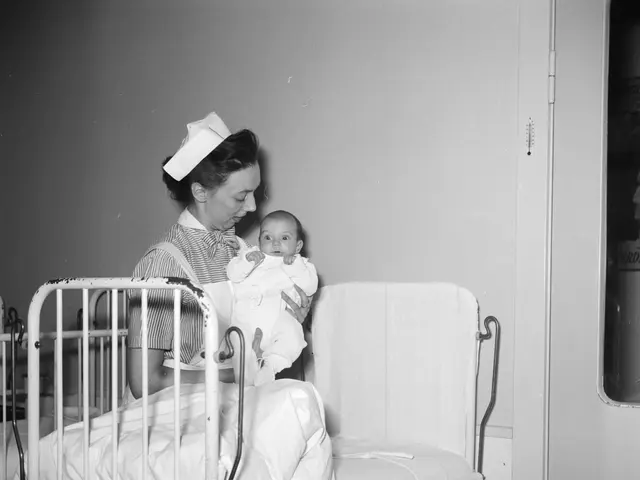Taking Over Baden-Württemberg: AfD's Election Strategy Revealed
The possible victory of the AfD in the upcoming state election - The Winning Strategy of AfD in the Upcoming Elections
The AfD, the far-right political party, feels it's standing tall and proud in the southwest, backed by current polls and the ongoing court battle with the German intelligence agency. The party has set its sights high for the 2026 state election: not just to become the dominant force, but to gain control of Villa Reitzenstein, the government seat in Stuttgart's half-height location. But how does the AfD plan to pull this off?
The Frontrunner
Markus Frohnmaier, the co-chairman of the southwest AfD, is the party's top candidate for the election. Emil Sänze, another co-chairman, proclaimed in Stuttgart that the AfD aspires to be a people's party, with a goal to assume the role of Minister President. Frohnmaier, a close associate of AfD leader Alice Weidel, has served as Weidel's spokesman in the past. Weidel, in turn, is a member of the southwest state association, with her constituency based on Lake Constance. Frohnmaier, a Romanian adoptee raised in Weil der Stadt, Baden-Württemberg, played a vital role in founding the AfD's youth organization, Junge Alternative, which has recently disbanded. Frohnmaier has drawn criticism for his ties to Russian politicians.
The Agenda
Despite being labeled as extremist, the AfD positions itself as a conservative, reliable alternative to the CDU. In terms of policy, the AfD seeks to implement a 9-point immediate program within the first 100 days in power. The message: Baden-Württemberg is in decay, and only the AfD can halt its descent, regardless of whether you're talking about the economy, education, or security.
Some of the key demands include revitalizing Baden-Württemberg's economic relations with Russia, reallocating the €400 million currently being pumped into climate protection measures to provide energy discounts for citizens and businesses, and making all public companies and authorities in the state purchase vehicles from the southwest for their fleets.
In education, the right-wing populists advocate for the demise of comprehensive schools and the implementation of flagged schools in black-red-gold. They also support increasing police presence in the southwest and conducting a referendum on immigration. Baden-Württemberg's citizens would vote on whether to return all migrants without residence rights at the borders. An AfD-led state government would also opt out of the nationwide refugee distribution system according to the Königstein key.
The Odds
The AfD acknowledges that the successful implementation of its program hinges on a strong election performance. However, the program is not deemed an "unrealistic fantasy," considering the AfD's significant political clout across the country. According to recent polls, the AfD would likely improve upon its last result in the state election, which took place in 2021, where they garnered 9.7% of the votes.
A Twist in the Polls
A new survey by Insa, commissioned by the "Swabian News," reveals that the AfD is currently polling at 19% among voters in Baden-Württemberg, outpacing the Greens, led by incumbent Minister President Winfried Kretschmann, who are at 17%. The CDU remains the strongest force in the southwest, retaining 31%.
Although the AfD won't achieve an absolute majority in the state with these numbers, some have suggested the possibility of a CDU-AfD coalition. Nevertheless, the AfD's chances of participating in the government are limited, as all other parties refuse to collaborate with the right-wing populists. CDU leader Manuel Hagel has consistently and aggressively rejected any form of cooperation.
Thus, the AfD's dreams of implementing its immediate program and moving into Villa Reitzenstein in Stuttgart may remain just a dream for the moment.
Key Terms:- AfD- State Election- Southwest- Markus Frohnmaier- Baden-Württemberg- Stuttgart- CDU- Legal Dispute- Poll Numbers- Villa Reitzenstein- Election Campaign- Federal Parliament- Alice Weidel- Constitutional Protection- Leader- Lake Constance- Romania- Björn Höcke
Insights:- The AfD aims to capitalize on its right-wing populist platform during the upcoming state election in Baden-Württemberg, focusing on issues like strict immigration policies, social welfare prioritization for "native Germans," and opposition to what it describes as "state authoritarianism."- The party faces competition from a new political party launched by Frauke Petry, a former co-leader of the AfD who is distancing herself from the party's more extreme factions. Her new party emphasizes an "anti-statist" stance and cultural connections to the West, which could split the right-wing vote and complicate the AfD's prospects.- The party's legal classification as a right-wing extremist movement by German authorities impacts its public image and political freedom, adding pressure to its operations and electoral ambitions.
- The AfD, in its bid for the 2026 state election, intends to surpass dominance and seize control of Villa Reitzenstein, aiming to be the ruling party in Baden-WÜrttemberg, with Markus Frohnmaier, a key associate of AfD leader Alice Weidel, serving as their top candidate.
- The AfD shows an ambition to implement a 9-point immediate program within the first 100 days in power, focusing on areas like financial and technical cooperation with Russia, energy discounts, and local procurement, aiming to revitalize the economic condition of Baden-WÜrttemberg.
- The party often faces criticism for advocating for extremist policies, particularly regarding immigration, seeking a referendum on the matter, and pushing for the demise of comprehensive schools, with flagged schools as an alternative.
- Despite the extremist label, the AfD positions itself as a conservative, reliable alternative to the CDU in terms of policy and politics, hoping to bypass the party's current lead in the polls.
- Recent polls show the AfD surging in popularity, currently polling at 19% in Baden-WÜrttemberg, outpacing the Greens (17%) and retaining momentum behind the CDU (31%), though a CDU-AfD coalition may not be feasible given the latter party's rejection of any form of collaboration.
- The AfD's ambitious plans and election strategy face challenges, including competition from new parties like the one led by Frauke Petry, legal disputes with the German intelligence agency, and opposition from other political parties amid concerns about immigration policies and extremist ideology.








